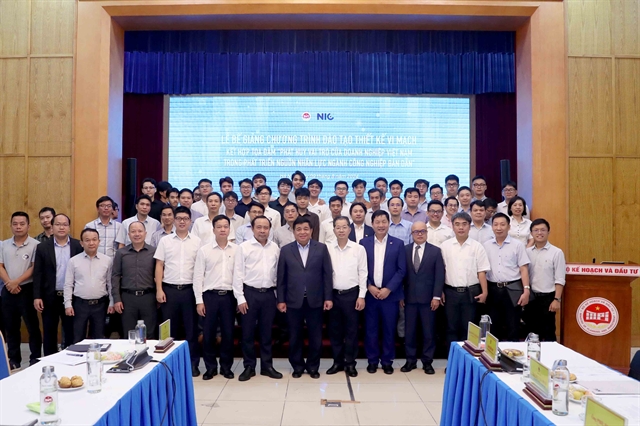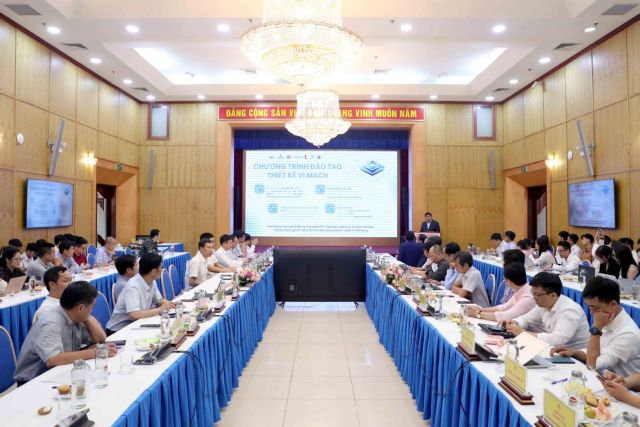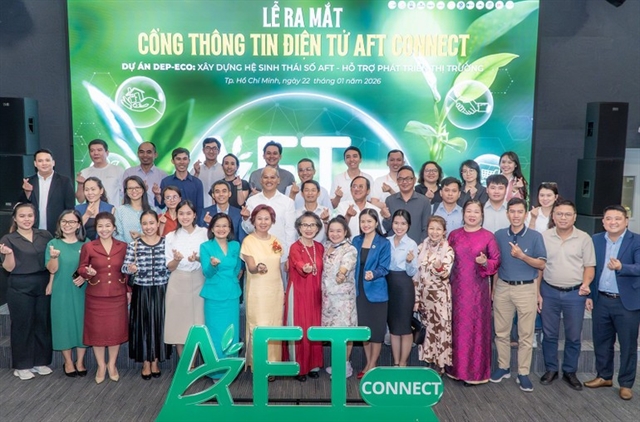 Economy
Economy

 |
| Minister Nguyễn Chí Dũng (centre) and representatives pose for a photo at the seminar. — VNS Photo |
HÀ NỘI — Minister of Planning and Investment (MPI) Nguyễn Chí Dũng emphasised that a seminar he attended was a key initiative in advancing the project aimed at developing human resources for the semiconductor industry, with goals extending to 2030 and a vision towards 2050.
Minister Dũng chaired the seminar titled 'Promoting the Role of Vietnamese Enterprises in Developing Human Resources for the Semiconductor Industry,' in Hà Nội on August 9.
Dũng noted that his ministry's efforts to lead and drive the training of semiconductor talent are receiving strong support and are being actively implemented across various localities, businesses and educational institutions.
The minister acknowledged and expressed gratitude for the support and collaboration from various ministries and organisations, including the Ministry of Education and Training, the Ministry of Information and Communications, the Ministry of Science and Technology, the Ministry of Labour, Invalids and Social Affairs, as well as Đà Nẵng City, HCM City and Hà Nội.
Dũng also highlighted the contributions of the National Innovation Center, TreSemi and FPT Group for their successful implementation of training programmes.
He expressed confidence that the goal of training 50,000 engineers for the semiconductor industry, including 15,000 specialised in design, will be met.
 |
| An overview of the seminar. — VNS Photo |
Secretary of the Đà Nẵng City Party Committee Nguyễn Văn Quang, representing the localities, reaffirmed the city's commitment to fostering a supportive environment for businesses involved in semiconductor human resource development.
He also expressed interest in receiving more information and exploring specific, practical cooperation opportunities to enhance the training and development of talent in the semiconductor field, particularly in relation to artificial intelligence, within Đà Nẵng City.
The minister told participants that the Government is set to issue significant decisions in August, addressing the points raised by Secretary Nguyễn Văn Quang.
MPI has submitted a project on staffing development for the semiconductor industry to 2030, with a vision to 2050, to the Prime Minister. On August 5, the Prime Minister signed a decision to establish the National Steering Committee on the Development of the Semiconductor Industry, with the MPI designated as the standing agency.
Vũ Hải Quân, director of Hồ Chí Minh City National University, highlighted the crucial role of State agencies and businesses in the training process. He emphasised that such collaboration enhances the quality of education and better aligns it with market needs, facilitating smoother transitions for graduates.
He also suggested that the successful cooperation model between NIC and Hồ Chí Minh City National University, FPT and other educational institutions should be replicated.
At the seminar, all participants recommend the Government soon approve the semiconductor human resource development project so that Việt Nam does not miss its opportunity
Speaking at the event, Trương Gia Bình, chairman of FPT, praised the efforts to develop training programmes tailored to the semiconductor industry’s needs. He emphasised that these programmes are essential for achieving the goal of adequately preparing human resources for the industry.
During the event, the Basic VLSI IC Physical Design programme concluded with a closing ceremony. The three-month course, attended by 70 outstanding students from major universities across the country, was deemed a success.
Experts noted that many graduates have already secured positions with leading microchip design companies such as Marvell, Synopsys, FPT, Faraday and Samsung.
Among the participants, nearly 20 students were hired by these major corporations, some students are in their third year of studies and many others have been awarded scholarships for further postgraduate education abroad. — VNS




